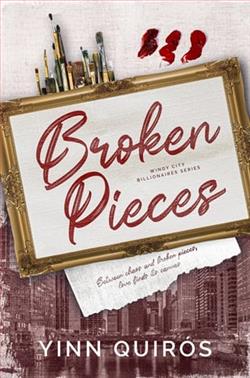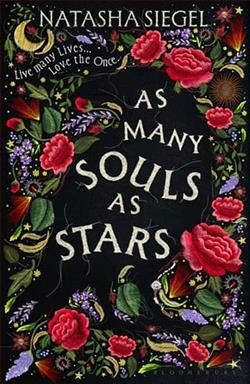Page 49 of Ringer
“It’s all right. My first was a Haitian. My mom nearly flipped her shit. You know, you could be pretty if you weren’t sobasic.” This was another thing Raina did: slid sideways into new thoughts without any warning. “You ever think of cleaning up a bit?”
They went to the big Target, whose bright-white look and antiseptic smell reminded Lyra painfully of Haven. In the cosmetics aisle Raina opened tubes of lipstick and little plastic-shrouded tubs of eye shadow, experimenting with color on Lyra’s cheeks and on the back of her hand, keeping up her nonstop stream of conversation.
“You got big eyes, that’s good, and your lips are decent too....”
She’d almost finished with Lyra’s eyes when a woman in a red polo shirt came to yell at them. “What do you think you’re doing? Those aren’t for sampling.”
“Well, how was I supposed to know?” Raina made her face go blank and dumb, and Lyra had a sudden memory of some of the Yellow crop back at Haven, a bad crop full of replicas whofailed to thrive. After the Yellow crop, God mandated that all the newest replicas needed at least two hours of human contact a day.
“Don’t give me that duff. I’ve seen you in here before.”The woman had a name tag, S-A-M. “I’ve half a mind to call the cops on you myself.”
“Don’t,” Raina said. “We’ll pay for everything. We always meant to, anyway.”
The woman shook her head again. But she said, “All right. Follow me.”
They were halfway to the checkout lanes when Raina gripped Lyra’s elbow and steered her instead toward the exits. They were almost at the door before S-A-M realized they were no longer following and shouted.
“Run,” Raina said, and keeping her grip on Lyra’s arm, she and Lyra hurtled toward the exit. An alarm screamed. Memories lit up flash-like in Lyra’s head: Code Black, the sweaty heat, a spring storm that knocked out the power and forced the generators on. They were in the parking lot. They were laughing, and the sky was spinning overhead, and Lyra was dizzy with a sudden happiness that punched her breath out of her chest. She had never laughed like that—she was surprised by how it came, in waves that rocked her whole body and made her feel fizzy and bright and airless.
Raina’s trailer was the same size as Rick’s but even more cluttered, and Lyra felt a pang to see so many possessions worn and used and taken for granted—family photos hung crookedly in plastic frames, throw pillows shaggy with dog hair, mugs holding a crown of pens. Bycomparison, Rick’s trailer was as cold and impersonal as the hallways of Haven.
On a side table sheeted with mail, she noticed the same glossy brochure she had seen in Caelum’s shoe box of belongings. This time she focused on the letters until they ran into meaning:Nashville Elvis Festival.
Raina caught her looking. “Don’t tell me you’re an Elvis freak too?”
Lyra didn’t answer: silence, as always, was like a corner for retreating.
“My mom goes every year. Can you believe she met her boyfriend there? Look. He even made it into the brochure.” Raina shook out the folds of the brochure so it opened suddenly into a fan of narrow pages, and Lyra lost her breath.
Replicas. Dozens of them, all men, identically dressed in white, but not in hospital gear: in suits with beautiful detailing.
They looked well-fed. They looked well, period.
“That’s Mike,” Raina said, and plugged a finger on one of the replicas in the third row. “He won two years ago. My mom saw him perform ‘Hound Dog’ and walked right up to him and asked him out.” She rolled her eyes. “It’s been true love ever since.”
“I don’t understand.” Lyra’s voice sounded distant to her. “Where is this place?”
Raina shot her a puzzled look. “You’ve never been to Nashville?” When Lyra shook her head, Raina frowned. “Where did you come from, again?”
“Florida,” Lyra said, although she had never known where she was from until Gemma had told her. She knew only Haven, and Spruce Island, and Barrel Key. She hadn’t understood the world was so big it had to be endlessly divided: into countries, states, towns, neighborhoods. Was it possible the world was so big it included places, like this Nashville, where replicas were made and lived happily, in the open? “We—we had replicas there too.”
Raina squinted, like she was trying to see Lyra from a distance. “Impersonators, you mean?”
Lyra shook her head; she didn’t know. Her body had turned to vapor. She was suddenly overwhelmed by a sense of all the things in the world she didn’t understand coming toward her, a hard high wave she couldn’t duck or ride. But she clung to the idea of a place where replicas could smile and be photographed in the open: it was a reedy, ropy line of hope.
“I think the whole thing’s stupid,” Raina said. “A bunch of grown men dressing up like some dead rock star from a thousand years ago. I mean, his music isn’t even that good.”
“What do you mean, dressing up?” Lyra asked.
“Well, you know, dyeing their hair, growing sideburns,shopping for costumes and stuff. I mean, it’s just make-believe. But Mike acts like he reallyisElvis.” Then, seeing Lyra’s face: “Don’t tell me you don’t know who Elvis is.”
Lyra, miserably confused, said, “He’s like the God in Nashville?”
She was reassured when Raina laughed and agreed. “Oh, for sure,” she said. “He is definitely the God in Nashville.”
In the bathroom, Raina finished Lyra’s makeup, and then dressed her, too.
“You look nervous,” she said, when she stepped back to evaluate her work. “Are you nervous?”















